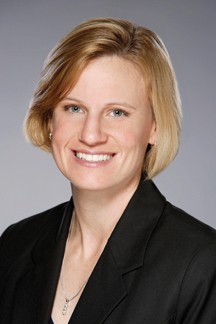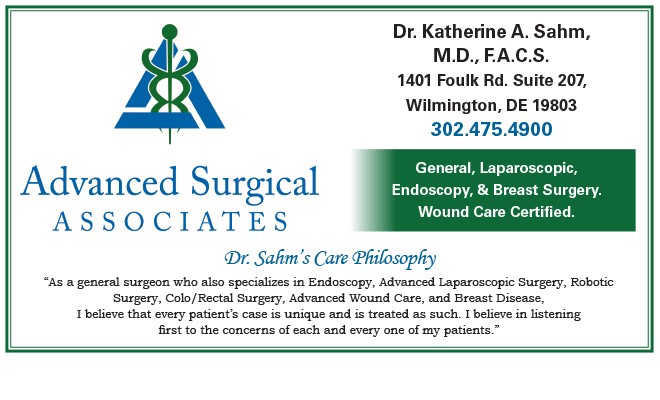Wound Care

By Dr. Katherine A. Sahm, M.D., F.A.C.S.
Wound prevention and management can be challenging, especially when complicating factors are involved, as in with patients that increase the risk of new wounds or prolonged healing of existing wounds. As a result, maintenance of healthy skin and early detection of those who are at risk for skin breakdown is a must.
Some wounds are very hard to treat even after months or weeks of standard wound care. Slow healing foot and leg wounds are most often in patients with diabetes, artery disease, advanced age, and other diseases that cause poor blood flow or nerve damage.
Healthcare professionals must recognize that many internal and external factors can affect the healing and prevention of wounds. Ultimately, the body must heal itself so the purpose of the healthcare team, including the physician, is to optimize the body’s ability to prevent or heal a wound.
When seeking treatment for new or chronic wounds it is important that the patient or caregiver is able to describe how the wound started, how it evolved, what has made it better and what has made it worse, if known. Lifestyle choices such as smoking, substance abuse, and level of physical activity all are relevant when describing a wound.
A chronic wound is a wound that does not heal in an orderly set of stages and in a predictable amount of time the way most wounds do; wounds that do not heal within three months are often considered chronic. However, an evaluation when a wound first appears is recommended.
Common conditions associated with chronic wounds:
- Arthritis
- Diabetes
- Venous insufficiency
- Peripheral Arterial Disease (PAD)
Treatment:
Your wound treatment begins with an evaluation of your medical history and symptoms. There are many components of wound assessment completed by physicians. Common assessment parameters include: wound size, depth, edges, undermining, peri-wound skin, tissue type (granular, slough, necrotic) are all utilized to asses and determine the wound status.
Wound treatment includes:
- Offloading and wound protection
- Skin and tissue grafting
- Surgical removal of dead tissue
- Wound dressings
- Negative pressure wound therapy
- Lymphedema management
- Infection control
Chronic wounds that won’t heal are often painful and can lead to additional problems if left untreated. Wound care delivered in a comprehensive manor reduces the risk of amputation and other debilitating health.
Your wound care begins with an evaluation and history. A complete evaluation and examination of your wound will be done and we will work with other healthcare professionals to address any underlying conditions.
Dr. Sahm is a Board Certified General Surgeon who is also wound care certified.
Advanced Surgical Associates is Dr. Sahm’s private practice. The office is at located at 1401 Foulk Road, Suite 207, in North Wilmington where she provides specialized services in: general surgery, advanced laparoscopic procedures, endoscopy and colonoscopy, breast cancer surgery, and advanced wound care. Call for an appointment and evaluation at 302-475-4900.
Dr. Sahm says…
I am a native Delawarean trained in minimally invasive surgery and general surgery. I have sought out further training in wound care and hyperbaric medicine and am certified in wound care. I served two tours as a forward surgeon in Iraq in 2008 and 2010. I am a participating breast surgeon at the Helen Graham Cancer Center. I enjoy getting to know my patients and their families and caring for their surgical needs.





